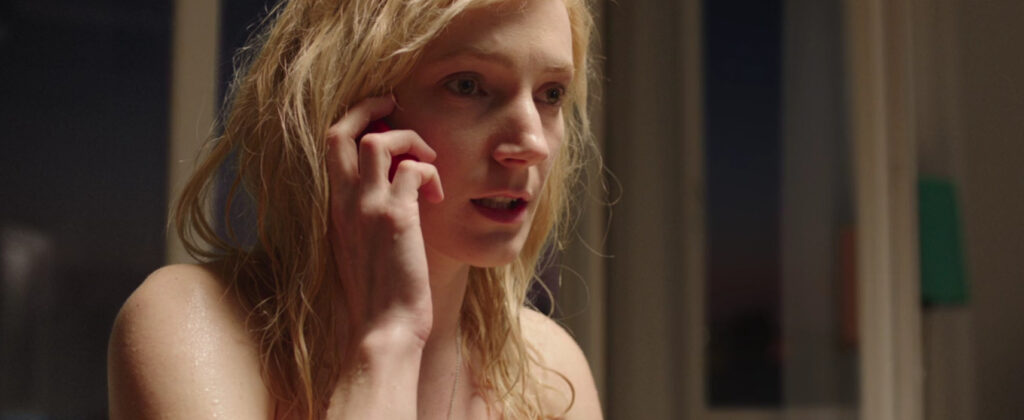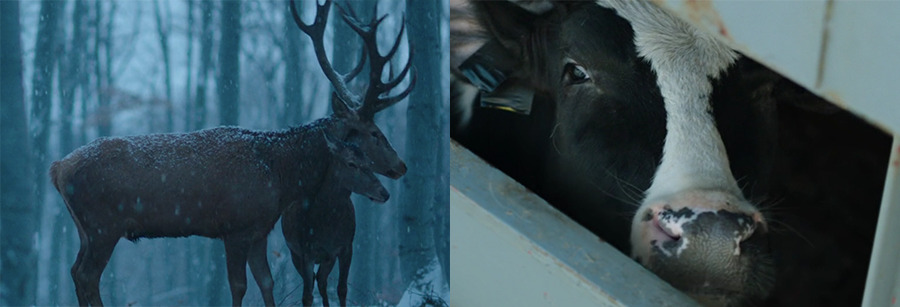I absolutely love the fact that many of you are going to abhor this movie. I revel in this fact. I delight even! hahahah. It makes me giddy I’m so excited about this fact. I mean, why else are we here than to challenge our assumptions? Why else, then to be pushed and pulled by a movie’s mindset and dialectic? (Raw entertainment? PSHAW! No.) And today, I bring to you the movie, Testről és lélekről. Which is Hungarian for On Body and Soul. And yes, this is a foreign language film. And no, we haven’t even gotten to the stuff that is going to challenge you yet. The need to read was not the problem I thought you’d have with this one. The movie was written and directed by Ildikó Enyedi and it is the 2017 Hungarian film that focuses itself on a slaughterhouse and the new meat inspector for the plant. As the movie unspools, the two learn that they share conjoined dreams. The film won the Golden Bear of the 67th Berlin International Film Festival. The GOLDEN BEAR! And it was selected as the Hungarian entry for the Best Foreign Language Film for the 90th Oscar awards. And Alexandra Borbély even won the European Actress award at the European Film Awards for her role in the film. But to many of you Americans I hear you saying…. but is Keanu Reeves in it? I just can’t right now.
Well, as luck would have it, if you haven’t seen the film yet, it’s now on Netflix for your viewing enjoyment. Whatever you do, just click that Netflix link and watch it. And whatever you do, don’t hit play on this trailer.
So now… you have a moral choice. One of a billion today alone. You can choose to keep reading. And fail. Or, you could go watch the film… and then return. Let’s chalk this one up in the win column shall we? Great. Thanks for that. Then, after you’ve watched, you can join us in the conversation of the comments at the bottom of the post.
On Body and Soul Movie Walkthrough
The movie starts with deer walking in the forest. A buck and a mare. Both majestically strolling through the snow, eating leaves, near a gorgeous pond. And when the movie started I assumed this was fluff. Just extra ambiance. No. This is the point. These two deer? They are 100% the point of this movie. But for now, let’s leave them to their own devices, and we’ll return to them in time.
Instead, let’s turn our attention to this Hungarian abattoir. We watch as cattle are brought in, and are made quick work of, on their way to dinner tables around Hungary. Why? I mean, we just went from the majesty of two deer walking freely in the forest to these caged beasts, walking a deadman’s walk towards their inevitable deaths. It is an exceptional setting for a film like this one. Why are we here? Hrrm. Maybe we should hold that question, put a pin in it, and come back to it later.
Enter Mária Rácz. The new state quality inspector of the the plant and she is immediately the least popular person in the plant. Which, is interesting for a million reasons. Why doesn’t she fit in? At first it just seems like she is hardcore about rules and process. But then you start to realize, oh… no… that isn’t it at all. Mária literally has some sort of physical condition. Not autism. What is this that we are seeing play out here? And eventually I realized that she definitely has to have Asperger’s Syndrome – which, is sort of a high functioning autism. Mária settles in, but she is never really welcome by anyone at the plant, she can’t quit figure out how to fit in with others. She even continues going to her childhood therapist that has very obviously been helping her since she was little. He now obviously has issues continuing her care now that she is an adult. He even attempts to recommend someone else to help her out.
The other side of this yin-yang dynamic is Endre, the head of the abattoir. He is an older fellow, kindly enough, sort of a father figure for the entire plant. He keeps his eyes on the comings and goings of the people, the new hires, everyone. He subtly keeps the plant moving while constantly putting out little fires here and there without much effort. And when Endre attempts to befriend Mária she basically drops a hand grenade in his lap when she makes an impolite comment about his lame arm. Oh, did I not mention that yet? Yeah… Endre has a dead arm that he drags around with him everywhere he goes. So……… let me get this straight. This story is about a beautiful young lady with Asperger’s and a man past his prime with a lame arm? Huh. What was the name of this movie again? On Body… and Soul? Ok. I say we file that away for later as well.
Interestingly, each moment these two characters interact, there is so much tension, and so much frictive force at play when ever these two encounter each other you never know what direction it is going to go. And interestingly, Mária knows something went wrong in this conversation between herself and Endre. But she doesn’t know what. So each night, after they encounter each other, she uses the salt and pepper shaker to indicate herself or Endre, and she replays the conversation in order to analyze it and figure out where she went wrong. Originally we think she actually disdains Endre… but during these little replayings, we see so much more is there. What though? What is there?
And all the while, the movie is perforated with these sublime visions of deers walking in the snowy woods.
Eventually, the slaughter house hires a new butcher named Sanyi, who Endre disdains almost immediately. He comments that Sanyi is the new cock in the chicken house. Worse, Sanyi is completely unsympathetic to the animals they are killing here in the facility. Endre believes that if you aren’t compassionate of the animals and their unfortunate end that eventually you’ll do very poorly there and that he’ll burn out.
One day, the factory is put on notice that some mating powder was stolen and that the police would be doing an investigation into who did it. Endre, and his friend Jenő, the head of HR, both immediately believe that it was Sanyi who obviously stole the powder. Because, he’s the cock in the hen house, no? So it’s definitely got to be Sanyi. During the course of the investigation, the police recommend that Endre approve a psychological evaluation of all the employees. And it is during these evaluations that the psychologist listens as Mária and Endre tell how they both had the same dream the night before. Same exact, to a T. The psychologist assumes they were obviously having her on. But when the two learn that they dreamt the same dream they began investigating if this happens every night. And sure enough, each day, they share their dreams, and every day they are both dreaming literally the same thing every single night. And as this realization dawns, the two draw closer together. As their experiments with the conjoined dreaming expands, they try various things, like attempting to sleep in the same room together and other interesting permutations on the theme.
Eventually, Endre learns that it was Jenő, his friend, that stole the mating powder. Why? It’s intriguing that an older man would do that. But then if you think about it, Jenő has a very tenuous relationship with his wife. He likes to think he keeps her in line, but instead it’s her that is constantly telling him what to do. Pretty much every night she goes out to get her hair done, or meet a “female” friend. But Jenő knows that she has been sleeping around on him for years. So it might have been out of desperation that Jenő stole the mating powder. But Endre doesn’t seem to mind too much, and refuses to turn his friend in. But he is upset with Jenő that he tried to frame Sanyi for the theft. Which is why Endre apologizes to Sanyi for assuming the worst about him and treating him poorly.
Mária has definitely fallen for Endre. She is desperate to figure out how to allow others to come close to her after she recoils at Endre’s touch. Which left Endre confused enough to end their encounters and dream experiments. So Mária begins experimenting with touch, and also with music. Which is when she is offered a song about love by the attendant at the music store. But the setup on this moment is brilliant – Mária, determined to feel this idea of love, to experience the mood and emotional drawings of romantic connection, she’s looking for that feeling in music. And innocently, yet ignorantly, pulls 20 CDs and just starts working her way through them all there at the music store. But nothing. (As you would expect from someone as clueless as Mária randomly pulling CDs off the shelf.) Then the store employee gives her this:
Come on!? And this song is so critical to this movie that I think that the lyrics to this song might just be pivotal.
Forgive me, Hera
I cannot stay
He cut out my tongue
There is nothing to save
Love me, oh Lord
He threw me away
He laughed at my sins
In his arms, I must stay[Chorus]
He wrote
I am broke
Please send for me
But I am broken too
And spoken for
Do not tempt me
Uh, you lost me at Hera. Well, Hera was a Grecian goddess of fertility, family, and of women. But she is most known for her horrible jealousy. Hera was the wife of Zeus (and also his sister – you can’t beat the Spanish Soap Opera-ness of the Greco gods. It’s just impossible.) but was horribly jealous of Zeus’ two other wives and all of his children. But we see here the tragedy and chaos of love. “He cut out my tongue”, “He threw me away”, “I am broken too – and spoken for”. I can’t think of a better that has ever been dropped into the middle of a movie than this one. (Well, there was that one live performance of Axeman in Izzy Gets the F Across Town, but I digress.) And I have to say, that I might have listened to this song 4,000 times this past week alone. Ok, maybe closer to something like 4 or 5 hundred times. But that just sort of happens when you put the song on repeat and let it just soak into your soul.
Cough. Sorry. Right. So Endre, totally unhappy with the Mária train, called it off. And although he’s said he’s sort of given up on love and sex years previously, he sleeps with another woman. But he instantly regrets it and attempts to keep the woman from staying the night. And Mária, just beyond done with her inability to get out of her own mental frame and allow another person to embrace her (emotionally and physically) decides she is going to commit suicide. So she puts on her new favorite (and mine) song, gets into the bath, and slits one of her wrists.
….
…
..
And the CD player breaks, and the song stops.
.
.
.
And the phone rings.
.
.

The phone is the phone that she bought solely for him. You know, the one she got after telling him she didn’t have one, and he thought she was just lying to him in order to make him go away? Yeah, that phone. It rings. Blood pulsing into the bath. The end of her life just minutes away. The phone rings.
Mária runs to the phone in the other room… and answers it, sitting there on the chair, naked, her life blood pulsing onto the floor as she has this halting, and slow, prodding conversation with Endre. Blood pulsing. Onto the floor. And we watch as the camera pans from her talking on the phone, down to her wrist…
Endre – “I don’t really have any reason for calling… Am I bothering you?”
Mária – “No.”
Endre – “And are you having a pleasant evening?”
Mária – “I was listening to music. But something’s wrong with the player. I’m afraid it’s broken.”
Endre – “I didn’t even know you liked music.”
Mária – “Actually, I don’t. Just this one song. But now I can’t even listen to that anymore.”
Endre – “Too bad.”
Mária – “Well, yes.”
Endre – “Alright then… Bye. Have a nice evening.”
Mária – “You have a nice evening too.”
Endre – “Sorry…”
Did I mention she’s dying?
Hello? Are you still there?
Yes, I’m here.
I… I feel like I’m going to die… I love you so much.
I love you so much too.
I feel like I’m going to die, he says. I feel like I’m going to die. Literal, meet metaphor. Metaphor? Meet literal. And so Mária tells Endre that she has a quick errand she has to attend to before heading over… but that she’ll be there soon. And when the doctor, who refashioned her wrist, tells her that she’ll need to stay over for a psych eval., Mária makes a break for it. And later that night, they make love – slowly, and cautiously. And the next morning they go through the monotony of the morning routine. He spreads crumbs on the table as he makes his toast, and she sweeps them up. Hinting at a future of giving and taking, and maybe a life of love and shared dreams. And the share dreams? The literal shared dreams, they are done. After finding each other, they have stopped.
Now What Was That?
Well, there aren’t a lot of definitive answers for you as to what this movie is all about. BUT, there are threads that we can pull on to learn more about what this film might be saying. Like this question that the writer and director, Ildikó Enyedi, answered about the name of the movie, ‘On Body and Soul’. “Like so many things in this film, it was very instinctive. I thought of changing the title, but I kept it because it’s exactly what the film is about. It’s not so much that we have a soul and we have a body, it’s that the thing that we call our selves is a third thing, it’s the interference of the two. I wanted to show that we are somehow the interference of body and soul. It was quite important for me to show those things that were just about the body, by putting the accent on the soul. For example, by showing at length the face of a cow before it is shot, but not showing the shooting itself.”
Huh. Okay. A third thing. The interference.
And the juxtaposition? You know at the start, the dream-like perfection of the opening… and then the cut jump to cows being shunted through to the abattoir. Why? Well, body, and soul. The dream of perfection and a glorious life in the snowy woods with our soul mate, t-boned by a Mac truck at a hundred miles with the knowledge that all life ends in death. And much of it is tragic, and horrifyingly too soon. So we are seeing the glory of the hope of a soul’s existence while also seeing the imminence of death. Animal death. Here – I don’t think the words are helping:

On Body and Soul is the least presumptive or declaratory movie you’ve ever watched. These things are all allowed to just be. How you think about them is 100% up to you. Endre is older. It wouldn’t shock me much if you found Endre creepy as he is older than Mária. Do you only gravitate to the atrocities of the cows in the film? (After having a love filet mignon earlier in the evening.) Is that all too shocking even in spite of the fact that no actual deaths happen on screen? Is that what this movie is about for you? Okay. Then that is what it’s about.
But I would argue that maybe it is about transcending. Maybe it’s about this in between world of body and soul and possibly leaping for some third thing. We are tethered to this mortal coil. This is truth. None of us are gods, no matter what today’s New Age self help tapes you might be listening to would tell you. You have been born into this physical life. You might be flawed. You might be gloriously beautiful. But we are all heading towards the ground. While we are here though we have a chance for a bigger, bolder, more triumphant life. Mária is broken. She has Asberger’s, and yet she so desperately wants to be loved. And Endre, he’s broken. A limp arm. Physically damaged. But more so, they are more deeply broken in their need to be loved and to be seen. The single greatest scene in the whole movie was as the two fall asleep together. Mária picks up Endre’s lame hand, scoops it in her hand, and brings it up onto the bed as she holds it, and falls asleep… holding hands. That moment is transcendent, it is something else entirely. It is exultant perfection. And it’s almost as if love has hunted the two of them down, that outside of their own free will or decision, they have been chosen for love and wholeness together.

